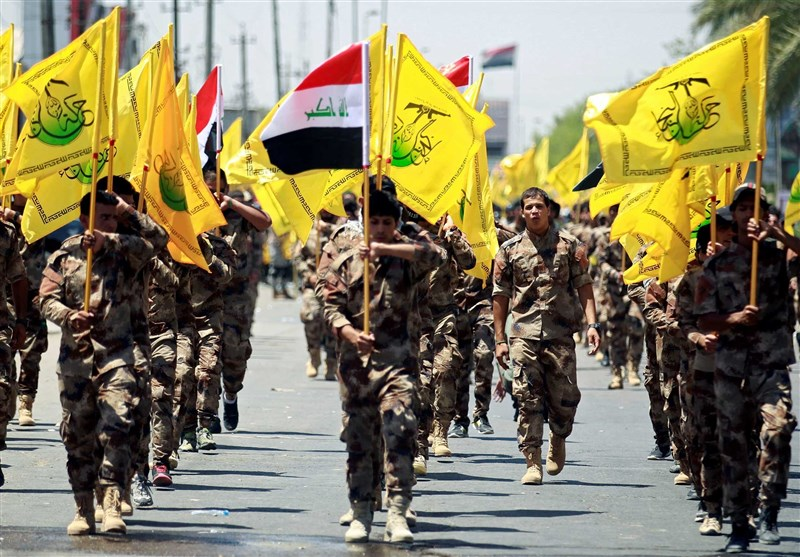
Since the 1979 revolution, Iran has built a network of proxies across the Middle East. By the end of 2023, Tehran had allies among more than a dozen major militias, some with their own political parties, that challenged local and neighboring governments. Iran’s Revolutionary Guards and the elite Qods Force provided arms, training and financial support to militias and political movements in at least six countries: Bahrain, Iraq, Lebanon, the Palestinian Territories, Syria and Yemen.
The United States has struggled to deal with Iran’s proxies short of military confrontation. Since 1984, and across six presidencies, the United States has sanctioned Iran’s extensive network of militia proxies in the Middle East to contain Tehran’s regional influence. The Trump administration increased the pace and scope of punitive economic measures between 2017 and 2021. But sanctions have never fully succeeded. In 2020, the State Department estimated that Iran gave Hezbollah $700 million a year. In the past, Tehran had historically given $100 million annually to Palestinian groups, including Hamas and Palestinian Islamic Jihad.
The Reagan administration first designated Iran a State Sponsor of Terrorism in 1984, but the Clinton administration was the first to sanction Iran’s proxies. In 1995, the United States sanctioned Hezbollah, a Shiite militia and political movement in Lebanon, Hamas, a Sunni militia and political movement in the Palestinian territories, and Palestinian Islamic Jihad, also a Sunni militia in the Palestinian territories.
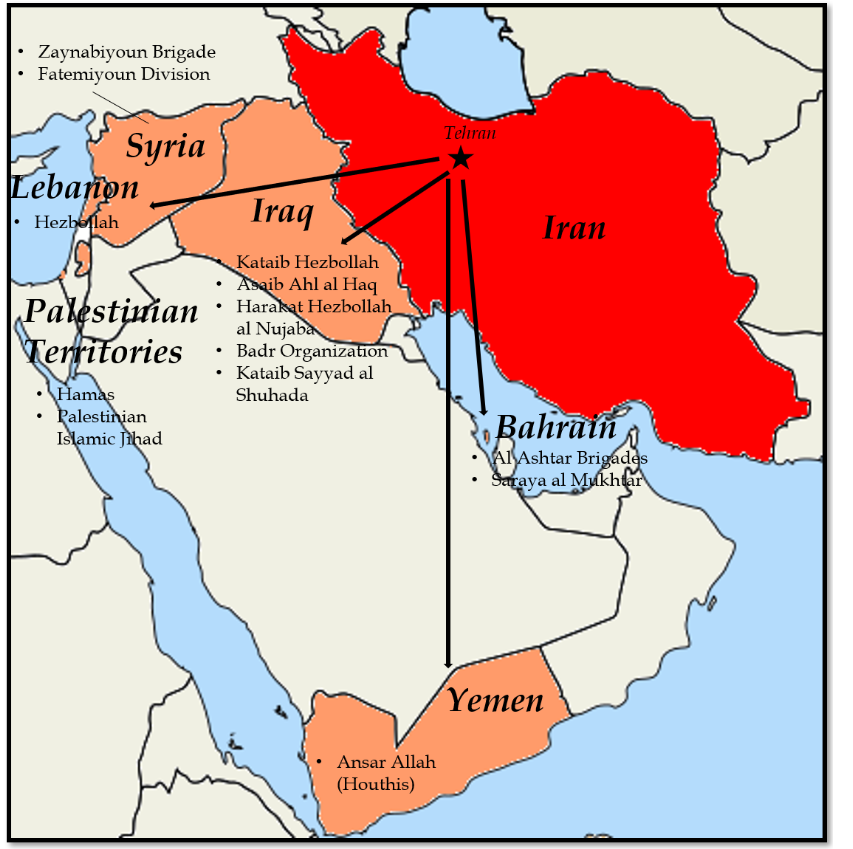
Between 1995 and 2022, five administrations – Clinton, Bush, Obama, Trump and Biden – sanctioned 15 Iranian proxy groups in seven countries.
- Clinton administration (1993 – 2001): three groups (Hezbollah, Hamas, Palestinian Islamic Jihad)
- George W. Bush administration (2001 – 2009): three groups (Hezbollah, Hamas, Palestinian Islamic Jihad)
- Obama administration (2009 – 2017): one group (Kataib Hezbollah)
- Trump administration (2017 – 2021): seven groups (Ansar Allah, Asaib Ahl al Haq, Harakat Hezbollah al Nujaba, Zaynabiyoun Brigade, Fatemiyoun Division, Al Ashtar Brigades, Saraya al Mukhtar)
- Biden administration (2021–2025): one group (Harakat Ansar Allah al Awfiya)
- Trump administration (2025- ): one group (Ansar Allah)
The first Trump administration designated seven groups and 32 leaders tied to Iran. One of President Trump’s top foreign policy goals was to limit Tehran’s regional influence and support for militant groups across the Middle East. “From Lebanon to Iraq to Yemen, Iran funds, arms, and trains terrorists, militias, and other extremist groups that spread destruction and chaos across the region,” he said in May 2017. “For decades, Iran has fueled the fires of sectarian conflict and terror.”
The Trump administration “has been relentless in its use of sanctions tools to increase pressure on the Iranian regime, not only for its support of terrorism around the world, but for its manifest human rights violations at home,” Nathan Sales, the State Department's coordinator for counterterrorism, told reporters in November 2020. “We remain committed to holding the regime accountable for the bloodshed that they have committed across the world in places like South America, in Europe, in Syria, in Lebanon, in Yemen, and elsewhere.”
The United States has the power to impose punitive economic sanctions either through presidential executive orders or laws passed by Congress.
Three presidents – Clinton, Bush and Obama – issued executive orders that empowered them to sanction Iranian proxies. They include:
- Under Executive Order 12947 signed by President Clinton in 1995, the Treasury or State Departments could designate foreign individuals or organizations as Specially Designated Terrorists for disrupting the Middle East peace process. Treasury and State’s powers to sanction terrorist groups were vastly expanded by the Immigration and Nationality Act in 1997 and Executive Order 13224 in 2001. President Trump officially terminated Executive Order 12947 in 2019 and brought these designations under Executive Order 13224.
- Under Executive Order 13224 signed by President Bush in 2001, the Treasury or State Departments can designate foreign individuals or organizations for committing, or pose a risk of committing, acts of terrorism that threaten U.S. interests or national security. It can also designate individuals, financiers and front companies as Specially Designated Global Terrorists for providing support to terrorist groups. A designation imposes sanctions, which prevents these individuals and entities from engaging in transactions with individuals or companies in the United States. It also blocks any assets that they have in the United States. Its goal is to disrupt terrorist finance networks and increase public awareness of individuals and groups connected to terrorism.
- Under Executive Order 13438 signed by President Bush in 2007, the Treasury or State Departments can designate individuals or entities that have committed, or pose a risk of committing, violence that threatens the peace and stability of Iraq. Its goal is to disrupt support for terrorists and insurgent groups in Iraq.
- Under Executive Order 13752 signed by President Obama in 2011, the Treasury or State Departments can designate individuals and entities that are responsible for human rights abuses and repression in Syria. The IRGC-Qods Force and its commanders are sanctioned under this order.
- Under Executive Order 13611 signed by President Obama in 2012, the Treasury or State Departments can designate individuals and entities that threaten the peace, security and stability of Yemen. Its goal is to disrupt support for individuals and groups threatening the peace and stability of Yemen.
- On September 10, 2019, President Trump amended Executive Order 13224. His order superseded older authorities and included individuals and entities who were previously sanctioned under Executive Order 12947.
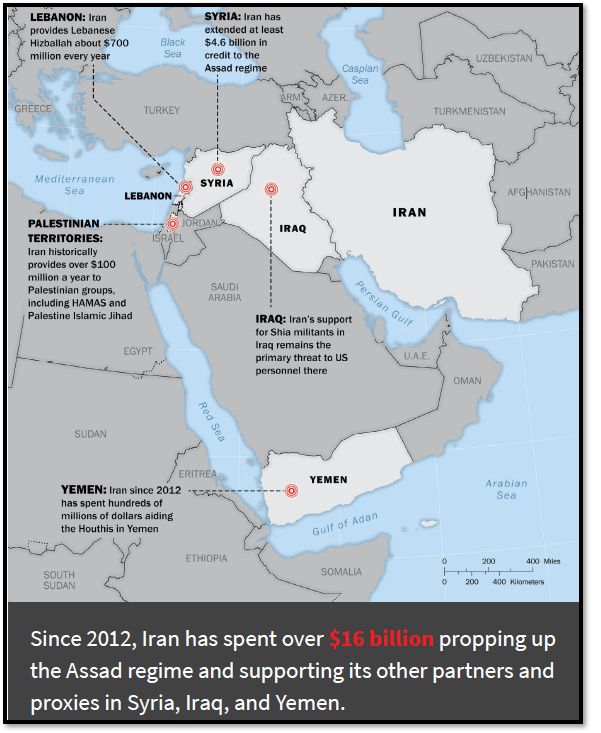
Congress has passed two laws to sanction Iranian proxies:
- Under Section 219 of the Immigration and Nationality Act, passed by Congress in 1997, the State Department can designate organizations as Foreign Terrorist Organizations (FTOs) for engaging in terrorist activities that threaten U.S. national security or interests. An FTO designation means that these groups cannot engage in transactions with individuals or companies in the United States and any assets they have in the United States are blocked. It also imposes immigration restrictions on organization members. Its goal is to limit terrorist organizations’ financial resources and increase public awareness.
- The Hezbollah International Financing Prevention Act, passed by Congress in 2015, and the Hezbollah International Financing Prevention Amendments Act, passed by Congress in 2018, exclude banks that conduct transactions with Hezbollah from the U.S. financial system. The 2018 amendment allows the United States to sanction foreign entities that finance or arm Hezbollah.
Since the mid-1990s, U.S. sanctions have been an important tool in disrupting terrorist financial networks, denying access to U.S. banks and deterring funders. But U.S. sanctions have not significantly impacted Iran’s relationships with its proxies. “Financial sanctions can’t affect many of the most important aspects of Iran’s proxy relationships, including the training, safe havens, and transfers of weapons and technology that it provides,” Ariane Tabatabai and Colin Clarke wrote in 2019. The following is a rundown of U.S. sanctions on Iranian proxies by country.
Related Material:
- Sanctions 1: Impact of Iran's Oil Exports
- Sanctions 2: What Iran Wants Lifted
- Sanctions 3: Iran's Economy in 2020
- Sanctions 4: The "Chilling Effect" of U.S. Sanctions on Iran
- Sanctions 5: Trump's "Maximum Pressure" Targets
- Sanctions 7: Iran’s Economy by the Numbers
- Sanctions 8: Timeline of Sanctions
Lebanon
Hezbollah (or Party of God)
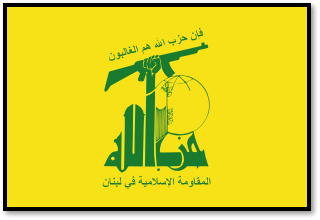 Hezbollah is a Shiite movement that was Iran’s first proxy in the Middle East. It has a militia founded in the early 1980s, with military and financial support from the Revolutionary Guards, and a political party, which first ran for office in 1992 after it emerged from the underground. In the 1980s, it carried out several suicide bombings against U.S. personnel and facilities in Lebanon and seized dozens of foreign hostages, including more than a dozen Americans. By 2020, Hezbollah had become the world’s most heavily armed non-state actor, with at least 130,000 rockets and missiles, according to the Center for Strategic and International Studies. It also held powerful positions in Lebanon’s government and economic sector.
Hezbollah is a Shiite movement that was Iran’s first proxy in the Middle East. It has a militia founded in the early 1980s, with military and financial support from the Revolutionary Guards, and a political party, which first ran for office in 1992 after it emerged from the underground. In the 1980s, it carried out several suicide bombings against U.S. personnel and facilities in Lebanon and seized dozens of foreign hostages, including more than a dozen Americans. By 2020, Hezbollah had become the world’s most heavily armed non-state actor, with at least 130,000 rockets and missiles, according to the Center for Strategic and International Studies. It also held powerful positions in Lebanon’s government and economic sector.
“Hezbollah’s budget, everything it eats and drinks, its weapons and rockets, comes from the Islamic Republic of Iran,” Hezbollah Secretary General Hassan Nasrallah said in 2016. In 2018, the Treasury Department estimated that Tehran provided Hezbollah with more than $700 million annually. In 2020, Iranian funding decreased due to U.S. sanctions, declining oil prices and the economic impact of the COVID-19 pandemic, according to Matthew Levitt of the Washington Institute for Near East Policy.
In 1995, the Clinton administration sanctioned Hezbollah and Secretary General Hassan Nasrallah for disrupting the Middle East peace process. It designated Hezbollah a Foreign Terrorist Organization in 1997. In 2001, the Bush administration designated it a Specially Designated Global Terrorist.
Between 1995 and 2020, the United States sanctioned a total of 44 Hezbollah leaders. In 2020, the Treasury Department charged Hezbollah’s senior leadership with “creating and implementing the terrorist organization’s destabilizing and violent agenda” against U.S. interests and partners around the world. Yet Hezbollah maintains global influence and remains “one of our nation’s most critical national security challenges,” Marshall Billingslea, Assistant Secretary for Terrorist Financing, said in 2019.
The Treasury and State Departments have sanctioned the following Hezbollah leaders:
- Secretary General Hassan Nasrallah: In 1995, for threatening to disrupt the Middle East peace process, in 2012, for overseeing Hezbollah’s support for Syria’s Assad regime, and in 2018, for acting on behalf of Hezbollah as its leader.
- Grand Ayatollah Muhammad Hussein Fadlallah: In 1995, for serving as a leading ideological figure of Hezbollah.
- Islamic Jihad Organization Head Imad Fayez Mughniyah: In 2001, for committing, or posing a significant risk of committing, acts of terrorism that threaten U.S. interests or national security. In 2011, the United States delisted him for no longer meeting the designation criteria under Executive Order 13224.
- Operative Hasan Izz al Din: In 2001, for his involvement in the hijacking of TWA Flight 847 on June 14, 1985.
- Operative Ali Atwa: In 2001, for his involvement in the hijacking of TWA Flight 847 on June 14, 1985.
- Senior leader Husayn al Shami: In 2006, for leading Bayt al Mal, a bank, creditor and investment arm for Hezbollah.
- Representative in South America Bilal Mohsen Wehbe: In 2010, for overseeing Hezbollah’s counterintelligence activity in the Tri-Border Area (Argentina, Brazil and Paraguay) and facilitating the transfer of funds from Brazil to Hezbollah.
- Senior military commander Mustafa Badr al Din: In 2012, for aiding Hezbollah’s terrorist activities and in 2015, for coordinating Hezbollah’s military activities in Syria.
- External Security Organization head Talal Hamiyah: In 2012, for aiding Hezbollah’s global terrorist activities.
- Senior commander Ali Mussa Daqduq al Musawi: In 2012, for planning the deadly attack on the U.S. troops at the Karbala Joint Provincial Coordination Center in Iraq on January 20, 2007.
- Foreign Relations Department liaison Ali Ibrahim al Watfa: In 2013, for leading a Hezbollah cell in Freetown, Sierra Leone, and coordinating the transfer of funds from Sierra Leone to Hezbollah in Lebanon.
- Foreign Relations Department official Abbas Loutfe Fawaz: In 2013, for leading Hezbollah activities, including recruitment and fundraising, in Senegal.
- Foreign Relations Department official Ali Ahmad Chehade: In 2013, for leading Hezbollah activities, including recruitment and coordinating travel, in Cote d’Ivoire.
- Military commander Khalil Harb: In 2013, for planning terrorist attacks against Israel and directing Hezbollah’s activities in Yemen.
- Political Council member Muhammad Kawtharani: In 2013, for directing Hezbollah’s activities in Iraq.
- Military commander Muhammad Yusuf Ahmad Mansur: In 2013, for directing terrorist operations in Egypt.
- Military commander Muhammad Qabalan: In 2013, for coordinating terrorist operations in Egypt.
- Islamic Jihad Organization member Mustapha Fawaz: In 2015, for conducting surveillance and relaying information for Hezbollah in Nigeria.
- Foreign Relations Department official Fouzi Fawaz: In 2015, for scouting recruits for military units and providing logistical support for Hezbollah in Nigeria.
- Foreign Relations Department representative Abdallah Tahini: In 2015, for fundraising and providing logistical support to Hezbollah in Nigeria.
- Jihad Council member Ibrahim Aqil: In 2015, for aiding Hezbollah fighters and pro-regime troops in Syria.
- Jihad Council member Fuad Shukr: In 2015, for aiding Hezbollah fighters and pro-regime troops in Syria.
- External Security Organization operative Muhammad Ghaleb Hamdar: In 2016, for acting on behalf of Hezbollah by assisting in the planning of terrorist acts.
- External Security Organization operative Yosef Ayad: In 2016, for acting on behalf of Hezbollah by assisting in the planning of terrorist acts.
- Military commander Haytham Ali Tabatabai: In 2016, for commanding Hezbollah’s special forces in Syria and Yemen.
- Senior leader Ali Damush: In 2017, for leading Hezbollah’s Foreign Relations Department.
- Military commander Mustafa Mughniyeh: In 2017, for aiding Hezbollah’s terrorist activities.
- Executive Council official Hashem Safieddine: In 2017, for committing, or posing a risk of committing, acts of terrorism.
- Deputy Secretary General Naim Qasim: In 2018, for acting for or on behalf of Hezbollah.
- Judicial Council leader and military commander Muhammad Yazbak: In 2018, for providing logistical and training support to Hezbollah.
- Political advisor to the Secretary General Husayn al Khalil: In 2018, for acting for or on behalf of Hezbollah.
- Political Council head Ibrahim al Amin al Sayyid: In 2018, for acting for or on behalf of Hezbollah.
- Representative to Iran Abdallah Safi al Din: In 2018, for acting as a conduit between Iran and Hezbollah.
- Leader Jawad Nasrallah: In 2018, for recruiting individuals for terrorist attacks against Israel in the West Bank.
- Senior External Security Organization member Salman Raouf Salman: In 2019, for coordinating the bombing of the Asociación Mutual Israelita Argentina in 1994.
- Member of Parliament Amin Sherri: In 2019, for acting as an interlocutor in Lebanon for Hezbollah financiers.
- Shura Council member and Parliamentary Council head Muhammad Hassan Rad: In 2019, for acting for or on behalf of Hezbollah.
- Liaison and Coordination Unit head Wafiq Safa: In 2019, for leading Hezbollah’s security apparatus.
- Intelligence Unit chief Husain Ali Hazzima: In 2019, for aiding Hezbollah’s terrorist activities.
- Jihad Council leader Ali Karaki: In 2019, for leading Hezbollah military operations in southern Lebanon.
- Jihad Council leader Muhammad Haydar: In 2019, for managing Hezbollah networks outside of Lebanon.
- Executive Council official Sultan Khalifa Asad: In 2020, for directing companies subordinate to the Executive Council.
- Central Council member Nabil Qaouk: In 2020, for acting as an official or leader of Hezbollah.
- Central Council member Hassan al Baghdadi: In 2020, for acting as an official or leader of Hezbollah.
- Chief of Hezbollah's Central Financial Unit Ibrahim Ali Daher: In 2021, for acting for or on behalf of Hezbollah.
- Senior official in Hezbollah's General Secretariat Hasib Muhammad Hadwan (also known as Hajj Zayn): In 2021, for fundraising on behalf of Hizbollah.
- Office manager Ali al Shair: In 2021, for providing financial and material support for Hezbollah. Al Shair was Hasib Muhammad Hadwan’s office manager and had been accepting financial contributions on behalf of Hezballah since 2000.
- Muhammad Ibrahim Habib al Sayyid: In 2024, for facilitating the smuggling oil and liquified petroleum gas to generate revenue for Hezbollah.
- Silvana Atwi and G.M. Farm: In 2024, for involvement in oil deals and other projects benefitting Hezbollah and the Qods Force.
- Haidar Houssam al Din Abdul Ghaffar, Global Tradeline SARL and Liban Oui SARL: In 2024, for importing food products to Lebanon, rebranding them, and selling them to generate profit for Hezbollah, and producing dairy products for the benefit of the organization.
- Houssam Hamadi and his company United Sons: In 2024, for supporting Hezbollah's finances.
The United States has also designated dozens of Hezbollah financiers, including businesspeople, front companies, charities and banks. It also sanctioned shipping companies and airlines for providing services to Hezbollah. The Treasury and State Departments have sanctioned the following individuals, companies and organizations:
- Assad Ahmad Barakat: In 2004, for serving as a key Hezbollah financier in the Tri-Border Area (Brazil, Paraguay and Argentina). In 2006, the Treasury Department sanctioned nine individuals and two companies in Barakat’s network.
- Al Manar Television Network and al Nour Radio: In 2006, for supporting Hezbollah fundraising and recruitment efforts.
- Islamic Resistance Support Organization: In 2006, for functioning as a key Hezbollah fundraising organization.
- Bayt al Mal and Yousser Company for Finance and Investment: In 2006, for functioning as Hezbollah’s main financial body and operating under the direct supervision of Secretary General Nasrallah.
- Bank Saderat: In 2006, for facilitating the transfer of hundreds of millions of dollars annually to Hezbollah, Hamas and Palestinian Islamic Jihad.
- Galería Page Shopping Center: In 2006, for serving as a funding source and headquarters for Hezbollah in the Tri-Border Area.
- Jihad al Binaa (construction company): In 2007, for being formed and operated by Hezbollah.
- Martyrs Foundation: In 2007, for providing financial support to Hezbollah, Hamas, and Palestinian Islamic Jihad.
- Al Qard al Hassan: In 2007, for managing Hezbollah’s financial activities.
- Ghazi Nasr al Din and Fawzi Kanan: In 2008, for providing financial support to Hezbollah.
- Kassim Tajideen: In 2009, for contributing tens of millions of dollars to Hezbollah. In 2010, the Treasury Department sanctioned his brothers, Ali and Husayn Tajideen, and their business network in Gambia, Sierra Leone, the Democratic Republic of the Congo, Angola and the British Virgin Islands, for providing support to Hezbollah.
- Waad Project (construction company): In 2009, for being established and operated by Hezbollah.
- Iranian Committee for the Reconstruction of Lebanon: In 2010, for providing material support to Hezbollah.
- Imam Khomeini Relief Committee—Lebanon Branch: In 2010, for being directed and run by Hezbollah members.
- Liner Transport Kish: In 2010, for providing material support, including weapons, to Hezbollah on behalf of the Revolutionary Guards.
- Ayman Joumaa: In 2011, for operating a drug trafficking and money laundering network that raised hundreds of millions of dollars for Hezbollah. The Treasury Department sanctioned nine other individuals and 19 entities in Joumaa’s network.
- Mahan Air: In 2011, for acting on behalf of the Qods Force and transporting personnel, weapons and goods for Hezbollah.
- Yas Air: In 2012, for acting on behalf of the Qods Force and working with Hezbollah and Syrian officials to transfer illicit cargo to Syria.
- Kamal and Issam Amhaz: In 2014, for procuring materials and technology for Hezbollah. The Treasury Department also designated their company, Starts Group Holding SAL, and its six subsidiaries.
- Adham Tabaja: In 2015, for maintaining close ties to Hezbollah leadership, holding properties on the group’s behalf, and securing business and investment opportunities for Hezbollah. The Treasury Department also sanctioned his company, Al Inmaa Group for Tourism Works. In 2018, it also sanctioned six individuals for acting on behalf of Adham Tabaja and his company.
- Abd al Nur Shalan: In 2015, for assisting in procurement and shipment of weapons and material to Hezbollah.
- Fadi Hussein Serhan: In 2015, for providing material support and services to Hezbollah. The Treasury Department also sanctioned his company, Vatech SARL.
- Adel Mohamad Cherri: In 2015, for providing material support and services to Hezbollah. The Treasury Department also sanctioned his company, Le Hua Electronic Field Co. Limited.
- Aero Skyone Co. Ltd. And Labico S.A.L. Offshore: In 2015, for being owned or controlled by Ali Zeaiter. In 2014, the Treasury Department sanctioned Ali Zeaiter for procuring dual-use technology for Hezbollah.
- Ali Youssef Charara and Spectrum Investment Group Holding SAL: In 2016, for investing in commercial projects that support Hezbollah.
- Mohammad Noureddine: In 2016, for providing financial services to Hezbollah through his company Trade Point International S.A.R.L.
- Hasan Jamal al Din and Muhammad al Mukhtar Kallas: In 2016, for providing financial services to Hezbollah financier Adham Tabaja.
- Mohammad Amer Alchwiki: In 2018, for facilitating the transfer of hundreds of millions of dollars to Hezbollah.
- Mohammad Ibrahim Bazzi: In 2018, for providing hundreds of millions of dollars to Hezbollah over many years.
- Al Bilad Islamic Bank: In 2018, for enabling Iran to move funds from Tehran to Hezbollah, as well as Iraqi groups backed by Iran.
- Nazem Said Ahmad: In 2018, for his role as a prominent Hezbollah money launderer and financier.
- Atlas Holding: In 2020, for being owned or controlled by the Martyrs Foundation, which was sanctioned in 2007. The Treasury Department also sanctioned three officials and 11 other entities that are affiliated with the Martyrs Foundation.
- Meamar Construction and Arch Consulting: In 2020, for being owned or controlled by Hezbollah.
- Ahmad Mohamad Yazbeck, Abbas Hassan Gharib, Wahid Mahmud Subayti, Mostafa Habib Harb, Ezzat Youssef Akar, and Hasan Chehadeh Othman: In 2021, for acting on or behalf of Al Qard al Hassan, a sanctioned financial firm used by Hezbollah.
- Talib Husayn Ali Jarak Ismail: In 2021, for coordinating the transfer of money to Hezbollah and meeting with Hezbollah officials to facilitate financial donations to Hezbollah.
- Jamal Husayn Abd Ali Abd al Rahim al Shatti: In 2021, for coordinating the transfer of money to Hezbollah and meeting with Hezbollah officials in Lebanon to donate money to Hezbollah.
- Ali Qasir: In 2021, for managing front companies for Hezbollah and assisting in the management of Hezbollah's bank accounts.
- Omid Yazdanparast: In 2021, for providing financial and material assistance in support of Ali Qasir, a Hezbollah financial facilitator.
- Samaneh Damirchilu: In 2021, for providing financial and material assistance in support of Ali Qasir, a Hezbollah financial facilitator.
- Mohammad Reza Kazemi: In 2021 for providing financial and material assistance in support of Meghdad Amini, a financial facilitator for Hezbollah.
- Mohammad Ali Damirchilu: In 2021, for acting on behalf of Ali Qasir, a financial facilitator for Hezbollah.
- Mostafa Puriya: In 2021, for selling electronics in the United Arab Emirates (UAE) through the company, Hemera Infotech FZCO, in support of Meghad Amini, a financial facilitator for Hezbollah.
- Hossein Asadollah: In 2021, for selling electronics in the United Arab Emirates (UAE) through the Dubai-based company Hemera Infotech FZCO in support of Meghad Amini, a financial facilitator for Hezbollah.
- Hemera Infotech FZCO: In 2021, for being owned and controlled by Hossein Asadollah, a Hezbollah associate.
- Morteza Minaye Hashemi: In 2021, for laundering money for the IRGC Qods Force and Hezbollah. Hashemi had previously collaborated with Mohammadreza Khedmati, who was sanctioned in 2018 with Meghdad Amini for acting as a financial facilitator for the Qods Force.
- PCA Xiang Gang Limited: In 2021, for being owned and controlled by Morteza Minaye Hashemi, a money launderer for Hezbollah.
- Damineh Optic Limited: In 2021, for being owned and controlled by Morteza Minaye Hashemi, a known money launderer for Hezbollah.
- China 49 Group Co. Limited: In 2021, for being owned and controlled by Morteza Minaye Hashemi, a money launderer for Hezbollah.
- Taiwan Be Charm Trading Co. Limited: In 2021, for being owned and controlled by Morteza Minaye Hashemi, a money launderer for Hezbollah.
- Black Drop Intl Co.: In 2021, for being owned and controlled by Morteza Minaye Hashemi, a known money launderer for Hezbollah.
- Adel Mohamad Mansour: In 2022 for enabling Hezbollah's overarching financial apparatus operating throughout Lebanon, including Al-Qard Al-Hassan (AQAH) and Hezbollah’s Central Finance Unit.
- Al Khobara: In 2022 for enabling Hezbollah’s overarching financial apparatus operating throughout Lebanon, including Al-Qard Al-Hassan (AQAH) and Hezbollah’s Central Finance Unit.
- Naser Hasan Neser: In 2022 for enabling Hezbollah’s overarching financial apparatus operating throughout Lebanon, including Al-Qard Al-Hassan (AQAH) and Hezbollah’s Central Finance Unit.
- Hassan Khalil: In 2022 for enabling Hezbollah’s overarching financial apparatus operating throughout Lebanon, including Al-Qard Al-Hassan (AQAH) and Hezbollah’s Central Finance Unit.
- Auditors for Accounting and Auditing directed by Ibrahim Daher: In 2022 for enabling Hezbollah’s overarching financial apparatus operating throughout Lebanon, including Al-Qard Al-Hassan (AQAH) and Hezbollah’s Central Finance Unit.
- Concepto Screen SAL Off-Shore: In 2022, for being used to facilitate the sale of oil in support of Hezbollah and the IRGC Qods Force.
- Hassan Moukalled: In 2023 for being a Hezbollah financial advisor and enabling Hezbollah to exploit and exacerbate Lebanon’s economic crisis.
- Rayyan Moukalled: In 2023 for working with Hassan Moukalled, his father, and enabling Hezbollah to exploit and exacerbate Lebanon’s economic crisis.
- Rani Moukalled: In 2023 for working with Hassan Moukalled, his father, and enabling Hezbollah to exploit and exacerbate Lebanon’s economic crisis.
- CTEX Exchange: In 2023 for being owned and controlled by Hassan Moukalled, a Hezbollah financial advisor.
- Lebanese Company for Information and Studies: In 2023 for being owned and controlled by Hassan Moukalled, a Hezbollah financial advisor.
- Lebanese Company for Publishing, Media, and Research and Studies: In 2023 for being owned and controlled by Hassan Moukalled, a Hezbollah financial advisor.
- 52 people and companies linked to Nazem Said Ahmad: In 2023 for helping Ahmad, a Hezbollah financier, launder money and avoid sanctions.
- Green Without Borders and its leader Zuhair Subhi Nahla: In 2023 for serving as a cover for Hezbollah’s activities in southern Lebanon, including training and weapons storage.
- Amer Mohamed Akil Rada and six linked people and companies: In 2023 for helping Rada, a Hezbollah operative and leader, fund the terrorist organization and support Hezbollah activities in Latin America.
- Abu Sumbol General Trading (L.L.C.): In 2023, for handling funds linked to Hezbollah on behalf of Said al Jamal, a Qods Force facilitator.
- Tawfiq Muhammad Said al Law: In 2024, for providing Hezbollah with digital wallets to receive funds from IRGC-Qods Force commodity sales, as well as to conduct cryptocurrency transfers on behalf of the sanctioned Syrian Qatirji Company.
- Adnan Mahmoud Youssef: In 2024, for helping Hezbollah money exchanger Hassan Moukalled and his company
- Mazen Hassan al Zein and his company, The Crystal Group: In 2024, for helping Hezbollah money exchanger Hassan Moukalled and his company
- Andriyah Samir Mushantaf: In 2024, for contributing capital to CTEX Exchange with Hezbollah money exchanger Hassan Moukalled
- Bashir Ibrahim Mansur: In 2024, for contributing capital to CTEX Exchange with Hezbollah money exchanger Hassan Moukalled
- Firas Hasan Moukalled: In 2024, for involvement in the business dealings of his father, Hassan Moukalled, and one of his companies
- Teleport Company SAL: In 2024, for involvement in activities in support of Hezbollah
- Star Ocean Shipmanage Ltd.: In 2024, for operating three vessels used to facilitate illicit trade for the Qods Force and Hezbollah.
- Ali Nayef Zgheib, Boutros Georges Obeid, Heavy Oil Distribution Company S.A.L., Heavy Oil Distribution Company SAL Offshore, Heavy Industrial Fuels SAL HIF, O.H.G. Holding Sal, European Lebanese International Trade S.A.R.L., and four tankers: In 2024, for involvement in Hezbollah's energy deals.
- Luay al-Mallah and four of his family's ships: In 2024, for facilitating illicit trade for the Qods Force and Hezbollah.
- Khaldoun Hamieh: In 2024, for drug trafficking and ties to Hezbollah.
- Raji Falhout: In 2024, for leading a gang that has worked with Hezbollah to generate revenue from kidnappings and Captagon trafficking.
Iraq
Kataib Hezbollah (or Party of God Brigades)
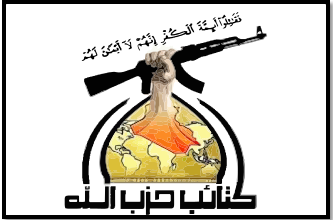 Kataib Hezbollah is a Shiite militia formed in 2007 and trained and armed by Iran’s Revolutionary Guards. In 2009, the State Department designated Kataib Hezbollah a Foreign Terrorist Organization, and the Treasury Department sanctioned its Secretary General, Abu Mahdi al Muhandis, for committing acts of violence against Coalition and Iraqi Security Forces. The United States imposed two additional rounds of sanctions on Kataib Hezbollah leadership in 2020.
Kataib Hezbollah is a Shiite militia formed in 2007 and trained and armed by Iran’s Revolutionary Guards. In 2009, the State Department designated Kataib Hezbollah a Foreign Terrorist Organization, and the Treasury Department sanctioned its Secretary General, Abu Mahdi al Muhandis, for committing acts of violence against Coalition and Iraqi Security Forces. The United States imposed two additional rounds of sanctions on Kataib Hezbollah leadership in 2020.
In 2014, the militia joined Iraq’s Popular Mobilization Forces (PMF) to fight ISIS but maintained its close ties with Tehran. “I will not shy away from mentioning the support of the Islamic Republic of Iran in terms of weapons, advising, and planning,” Muhandis said in 2018.
With Iranian backing, Kataib Hezbollah carried out the most sophisticated and effective attacks against U.S. forces and coalition allies in Iraq from 2007 to 2011 and 2018 to 2020. On December 27, 2019, it launched a rocket attack on the K1 military base near Kirkuk that killed a U.S. civilian contractor and wounded four U.S. service members and two Iraqi security forces personnel. In January 2020, the United States retaliated with a drone strike on Muhandis and Gen. Qassem Soleimani, the commander of the Qods Force, in Baghdad. It also designated its new secretary general, Ahmad al Hamidawi, a global terrorist in February 2020.
The Treasury and State Departments have sanctioned the following Kataib Hezbollah leaders:
- Secretary General Abu Mahdi al Muhandis: In 2009, for training Iraqi Shiite militias and directing attacks against Coalition and Iraqi Security Forces.
- Special Operations Commander Shaykh Adnan al Hamidawi: In 2020, for acting for or on behalf of Kataib Hezbollah.
- Secretary General Ahmad al Hamidawi: In 2020, for acting for or on behalf of Kataib Hezbollah.
- Senior leader Abd al Aziz Malluh Mirjirash al Muhammadawi (also known as Abu Fadak): In 2021, added to Treasury’s specially designated global terrorist list for links to Kataib Hezbollah,
The United States has also sanctioned front companies for acting on behalf of the Qods Force and providing aid to Iraqi militias backed by Iran. The Treasury Department has sanctioned the following firms:
- Reconstruction Organization of the Holy Shrines in Iraq: In 2020, for being controlled by the Qods Force and transferring millions of dollars to Kosar Company.
- Bahjat al Kawthar Company for Construction and Trading Ltd (Kosar Company): In 2020, for serving as a base for Iranian intelligence activities in Iraq, including weapons shipments to militias backed by Iran.
Asaib Ahl al Haq (or the League of the Righteous)
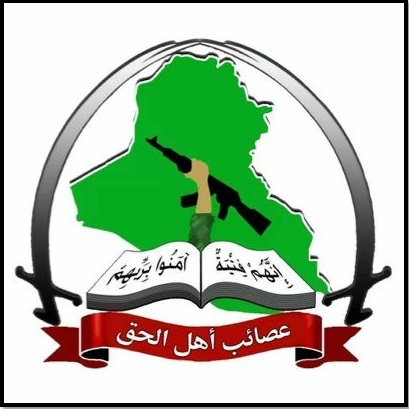
Asaib Ahl al Haq (AAH) is a Shiite militia that was founded in 2006 and trained, armed, and funded by Iran’s Revolutionary Guards and Lebanon’s Hezbollah. Between 2006 and 2011, when the U.S. military withdrew from Iraq, it launched more than 6,000 attacks on U.S. and coalition forces. In 2014, it joined the government-funded PMF to fight ISIS in northern Iraq. With some 20,000 members, it became one of the largest militias in the PMF, yet it maintained operational ties with Tehran. “It is no secret that Iran supports all the militias in this area and we are obviously one of them,” Qais al Khazali, the group’s leader, said in 2015.
In January 2020, the State Department designated AAH a Foreign Terrorist Organization. It also listed Khazali and his brother, Laith al Khazali, as global terrorists. “AAH and its leaders are violent proxies of the Islamic Republic of Iran,” Secretary of State Mike Pompeo said. “Acting on behalf of their masters in Tehran, they use violence and terror to further the Iranian regime’s efforts to undermine Iraqi sovereignty.”
The Treasury Department has sanctioned the following AAH leaders:
- Secretary General Qais al Khazali: In 2019, for committing human rights abuses against Iraqi protestors and leading the attack on an Iraqi government compound near Karbala in January 2007 that killed five U.S. soldiers.
- Senior leader Laith al Khazali: In 2019, for committing human rights abuses against Iraqi protestors and leading the attack on an Iraqi government compound near Karbala in January 2007 that killed five U.S. soldiers.
Harakat Hezbollah al Nujaba (or Movement of the Party of God’s Nobles)
.jpg) Harakat Hezbollah al Nujaba is a Shiite militia founded in 2013 and trained, armed and advised by Iran’s Revolutionary Guards. Its original purpose was to support Bashar al Assad in Syria against anti-regime rebels; in 2014, it expanded its mission to fight ISIS and joined the PMF. But it continued to receive support from Tehran. “We do not hide the fact that the technical and logistical support comes from the Islamic Republic,” Akram Abbas al Kabi, the group’s leader, told Al-Monitor in 2015.
Harakat Hezbollah al Nujaba is a Shiite militia founded in 2013 and trained, armed and advised by Iran’s Revolutionary Guards. Its original purpose was to support Bashar al Assad in Syria against anti-regime rebels; in 2014, it expanded its mission to fight ISIS and joined the PMF. But it continued to receive support from Tehran. “We do not hide the fact that the technical and logistical support comes from the Islamic Republic,” Akram Abbas al Kabi, the group’s leader, told Al-Monitor in 2015.
In 2019, the State Department designated Harakat Hezbollah al Nujaba a Foreign Terrorist Organization and listed al Kabi as a Specially Designated Global Terrorist. The Treasury Department sanctioned al Kabi in 2008, prior to the group’s formation, for conducting attacks against Coalition Forces in Iraq.
The Treasury and State Departments have sanctioned the following leaders:
- Leader Akram Abbas al Kabi: In 2008, for leading attacks against Iraqi and Coalition Forces and in 2019, for committing, or posing a risk of committing, terrorist acts.
Badr Organization
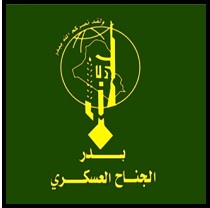 The Badr Organization is a Shiite militia formed in 1982 that has been funded, trained and armed by Iran’s Revolutionary Guards. It is the oldest and most powerful of Iran’s proxies in Iraq. Based in Iran during Saddam Hussein’s rule, it returned to Iraq after he was ousted by U.S. invasion in 2003. In 2014, it joined the PMF and was a pivotal force fighting ISIS from 2014 to 2017. It also has a political wing that has won seats in parliament.
The Badr Organization is a Shiite militia formed in 1982 that has been funded, trained and armed by Iran’s Revolutionary Guards. It is the oldest and most powerful of Iran’s proxies in Iraq. Based in Iran during Saddam Hussein’s rule, it returned to Iraq after he was ousted by U.S. invasion in 2003. In 2014, it joined the PMF and was a pivotal force fighting ISIS from 2014 to 2017. It also has a political wing that has won seats in parliament.
The U.S. government has not designated the Badr Organization, but the Treasury Department did sanction Abu Mustafa al Sheibani, the group’s former leader, in 2008. Al Sheibani left the Badr Organization in 2003.
The Treasury Department has sanctioned the following Badr Organization leaders:
- Former leader Abu Mustafa al Sheibani: In 2008, for committing attacks, or posing a risk of committing attacks, against Iraqi and U.S.-led coalition forces.
Kataib Sayyad al Shuhada (or the Masters of the Martyrs Brigade)
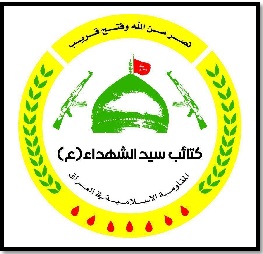 Kataib Sayyad al Shuhada is a Shiite militia founded in 2013 and funded and supported by the Revolutionary Guards. Its original mission was to support the Assad regime in Syria against a rebel uprising, but in 2014 it joined Iraq’s PMF to fight ISIS. The United States has not designated Kataib Sayyid al Shuhada a Foreign Terrorist Organization, although the Treasury Department designated Abu Mustafa al Sheibani, the group’s co-founder, a Specially Designated Global Terrorist in 2008.
Kataib Sayyad al Shuhada is a Shiite militia founded in 2013 and funded and supported by the Revolutionary Guards. Its original mission was to support the Assad regime in Syria against a rebel uprising, but in 2014 it joined Iraq’s PMF to fight ISIS. The United States has not designated Kataib Sayyid al Shuhada a Foreign Terrorist Organization, although the Treasury Department designated Abu Mustafa al Sheibani, the group’s co-founder, a Specially Designated Global Terrorist in 2008.
The Treasury Department has sanctioned the following leaders:
- Co-founder Abu Mustafa al Sheibani: In 2008, for committing attacks, or posing a risk of committing attacks, against Iraqi and U.S.-led coalition forces.
- Secretary General Hashim Finyan Rahim al Saraji: In 2023, for threatening the lives of U.S. and Global Coalition to Defeat ISIS personnel in Iraq and Syria.
Harakat Ansar Allah al Awfiya (or the Loyal Supporters of God Movement)
Harakat Ansar Allah al Awfiya (HAAA) is an Iran-backed Iraqi militant group that was originally founded in 2013 as a political entity. In 2014, HAAA became the 19th Brigade of Iraq’s Popular Mobilization Forces, and in 2023, they became a central militia within the Islamic Resistance in Iraq (IRI), an umbrella group for Shiite militias backed by Iran. The group has targeted U.S. interests and Syrian Democratic Forces, and they reportedly repressed Iraqi demonstrators demanding an end to government corruption, more job opportunities and better social services during the Tishreen Movement in 2019. Secretary General Haydar Muzhir Ma’lak al Sa’idi (also known as Haider Ibrahim al Gharawi), the leader of the movement, met with Supreme Leader Khamenei in Iran in 2023.
The U.S. State Department designated HAAA as a Specially Designated Global Terrorist on June 17, 2024 for its role in the IRI drone attack on Jan. 28, 2024, which killed three U.S. military personal at Tower 22 in Jordan, and for its continued threats against U.S. interests and Iraqi people. The State Department also designated Secretary General Haydar Muzhir Ma’lak al Sa’idi as a terrorist. The Treasury Department’s Office of Foreign Assets Control added HAAA and Secretary General al Sa’idi to its list of sanctioned Specially Designated Nationals.
Yemen
Ansar Allah (or the Supporters of God, also known as the Houthi movement)
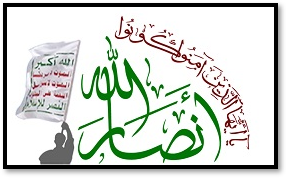 Ansar Allah is a Zaydi Shiite movement founded in the early 1990s that has fought the Yemeni government since 2004. The Houthis captured Yemen’s capital, Sanaa, in 2014 and helped oust President Abed Rabbo Mansour Hadi’s government in 2015. They have been supported by the Revolutionary Guards since at least 2011; Iran and Lebanese Hezbollah expanded training and increased arms shipments and arms after a Saudi-led coalition intervened in Yemen’s war in 2015.
Ansar Allah is a Zaydi Shiite movement founded in the early 1990s that has fought the Yemeni government since 2004. The Houthis captured Yemen’s capital, Sanaa, in 2014 and helped oust President Abed Rabbo Mansour Hadi’s government in 2015. They have been supported by the Revolutionary Guards since at least 2011; Iran and Lebanese Hezbollah expanded training and increased arms shipments and arms after a Saudi-led coalition intervened in Yemen’s war in 2015.
The United States sanctioned two senior Houthi military commanders in 2014 and the Ansar Allah founder, Abdul Malik al Houthi, in 2015. The Trump administration reportedly considered designating the Houthis a Foreign Terrorist Organization in November 2018 and in September 2020 to intensify pressure on Iran. In January 2021, the Trump administration announced that it would designate the movement as a Foreign Terrorist Organization. The Biden administration revoked the sanctions designation on February 16 but kept sanctions in place for three Houthi leaders. But the Biden administration reversed course in 2024 following Houthi attacks on commercial shipping and U.S. warships in the Red Sea. It designated the Houthis as a Specially Designated Global Terrorist in February 2024. The Trump administration re-designated the Houthis as a Foreign Terrorist Organization in March 2025.
The Treasury Department and the State Department have sanctioned the following Houthi leaders and officials:
- Military commander Abd al Khaliq al Houthi: In 2014, for threatening and undermining peace and stability in Yemen and in 2021, as a Specially Designated Global Terrorist.
- Second-in-command Abdullah Yahya al Hakim: In 2014, for threatening and undermining peace and stability in Yemen, and in 2021, as a Specially Designated Global Terrorist.
- Leader Abdul Malik al Houthi: In 2015, for threatening and undermining peace and stability in Yemen, and in 2021, as a Specially Designated Global Terrorist.
- Head of the General Staff Muhammad abd al Karim al Ghamari: In 2021, for threatening the peace, security or stability of Yemen.
- Military official Yusuf al Madani: In 2021, as a Specially Designated Global Terrorist.
- So-called "Minister of Defense" Mohamed al Atifi: In 2024, for threatening security in the Red Sea.
- Commander of Houthi maritime forces Muhammad Fadl Abd al Nabi: In 2024, for threatening security in the Red Sea.
- Coastal Defense Forces Chief and Director of the Houthi Naval College Muhammad Ali al Qadiri: In 2024, for threatening security in the Red Sea.
- Director of weapons procurement Muhammad Ahmad al Talibi: In 2024, for coordinating the smuggling of Iranian-provided weapons, missiles, UAVs, and components needed to manufacture weapons in Yemen.
- Iran-based Hasan Ahmad Hasan Muhammad al-Kuhlani: In 2024, for facilitating weapons smuggling.
- Oman-based spokesman Mohammad Abdulsalam: In 2025, for playing a key role in managing the Houthis’ internal and external financing network as well as securing weapons and other support from Russia.
- High-ranking operative Eshaq Abdulmalek Abdullah Almarwani: In 2025, for participating in high-level Houthi delegations to Russia and coordinating with other high-ranking Houthi operatives to advance Houthi interests internationally.
- Operative Mohamed Ali Al-Houthi: In 2025, for serving on the Supreme Political Council (SPC) and coordinating with Russian and Chinese officials to avoid hitting those countries' vessels in the Red Sea.
- Senior operative Abdulmalek Abdullah Mohammed E Alagri: In 2025, for representing the Houthis in meeting with Russian officials and issuing official statements on behalf of the group.
- Operative Khaled Hussein Saleh Gaber: In 2025, for meeting with Russian Ministry of Foreign Affairs officials, and maintaining a close relationship with Houthi finance official Said Al-Jamal and coordinating illicit procurement and financing.
- Operative Abdulwali Abdoh Hasan Al-Jabri and his company, Al-Jabri General Trading and Investment Co: In 2025, for facilitating the transfer of Yemeni civilians to Russian military units fighting in Ukraine.
The United States has also sanctioned the following individuals, companies and organizations for supporting the Houthis:
- Said al Jamal: In 2021, for using a smuggling network of front companies to fundraise for the Houthis in Yemen.
- Abdi Nasir Ali Mahamud: In 2021, for acting as a financial intermediary for Said al Jamal. Mahamud used his position as managing director of UAE-based Adoon General Trading FZE to transfer substantial funds for al Jamal.
- Adoon General Trading FZE: In 2021, for being owned and controlled by Houthi affiliate, Abdi Nasir Ali Mahamud.
- Adoon General Trading L.L.C.: In 2021, for being owned and controlled by Houthi affiliate, Abdi Nasir Ali Mahamud.
- Adoon General Trading Gida Sanayi Ve Ticaret Anonim Sirketi: In 2021, for being owned and controlled by Houthi affiliate, Abdi Nasir Ali Mahamud.
- Manoj Sabharwal: In 2021, for providing financial and material support to al Jamal. Sabharwal coordinated shipments of Iranian oil to the Middle East and Asia on behalf of him.
- Hani Abd al Majid Muhammad Asad: In 2021, for providing financial and material support for Said al-Jamal. As’ad managed Sa’id al-Jamal’s finances and collected payments for Sa’id al-Jamal’s shipping operations.
- Jami Ali Muhammad: In 2021, for providing financial and material support for Said al-Jamal. Ali Muhammad aided Sa’id al-Jamal by facilitating Iranian fuel shipments and the transfer of funds to the Houthis.
- Talib Ali Husayn Al Ahmad al Rawi: In 2021, for providing financial and material support for Said al Jamal.
- Abdul Jalil Mallah: In 2021, for providing financial and material support for Said al Jamal.
- Swaid and Sons: In 2021, for providing financial and material support for Said al Jamal. Swaid and Sons is an exchange house based in Yemen associated with the Houthis. Talib Ali Husayn Al Ahmad al Rawi and Abdul Jalil Mallah facilitated transactions worth millions of dollars to Swain and Sons. Said al Jamal used Swaid and Sons to send millions of dollars to IRGC Qods Force officials in Yemen. Al Rawi has helped transfer millions of dollars to Swaid and Sons. Mallah has been responsible for facilitating shipments of Iranian crude oil to Syria and the transfer of millions of dollars of Iranian crude oil to Hezbollah.
- Abdo Abdullah Dael Ahmed: In 2022, for providing financial and material support for Said al Jamal.
- Konstantinos Stavridis: In 2022, for providing financial and material support for Said al Jamal.
- Moaz Abdalla Dael Import and Export: In 2022, for providing financial and material support for Said al Jamal.. Moaz Abdalla Dael Import and Export transferred over $10 million to Said al Jamal.and worked with Abdi Nasir Ali Mahamud’s company, General Trading FZE. In 2021, Adoon General Trading FZE was previously sanctioned by the U.S. Treasury.
- Fani Oil Trading FZE: In 2022, for providing financial, material support, and being controlled by Konstantinos Stavridis. Konstantinos Stavridis used Fani Oil Trading FZE to purchase oil from Said al Jamal., the proceeds of which were sent to the Houthis. Mahamud’s Adoon’s company, General Trading FZE, was used to help facilitate the transaction.
- JJO General Trading Gida Sanayi Ve Ticaret Anonim Sirketi: In 2022, for being owned and controlled by Abdi Nasir Ali Mahamud.
- Al Foulk General Trading Co. L.L.C.: In 2022, for being owned and controlled by Abdo Abdullah Dael Ahmed.
- Garanti Ihracat Ithalat Kuyumculuk Dis Ticaret Limited Sirketi: In 2022, for providing financial and material support to Said al Jamal. Garanti Ihracat is a money exchange house that has facilitated millions of dollars worth of transactions in support of Said al Jamal.
- AlAlamiyah Express Company for Exchange and Remittance: In 2022, for being owned and controlled by Abdo Abdullah Dael Ahmed. AlAlamiyah has been used to move tens of millions of dollars in support of the Houthis.
- Al Hadha Exchange Co.: In 2022, for being owned and controlled by Abdo Abdullah Dael Ahmed. Al Hadha has been used by Sa’id al-Jamal to move tens of millions of dollars to support the Houthis.
- Aurum Ship Management FZC: In 2022, for providing financial and material support to Houthi affiliate, Abdi Nasir Ali Mahamud.
- Light Moon: In 2022, for being designated as property of which Houthi affiliate Abdi Nasir Ali Mahamud has an interest.
- Chiranjeev Kumar Singh: In 2022, for directly or indirectly acting on behalf of Aurum Ship Management FZC. Chiranjeev Kumar Singh is the managing director of Aurum Ship Management FZC.
- Peridot Shipping and Trading LLC: In 2022, for being owned and controlled by Chiranjeev Kumar Singh.
- Al Aman Kargo Ithalat Ihracat Ve Nakliyat Limited Sirketi: In 2023, for harboring millions of dollars deposited by the IRGC-Qods Force for onward shipment to the Houthis via Türkiye.
- Nabco Money Exchange and Remittance Co. (Nabco): In 2023, for serving as a financial intermediary for funds transferred to and from Yemen, including for IRGC-Qods Force funds deposited by al Aman. Nabco was a successor company to the U.S.-sanctioned al Hadha Exchange Co.
- Nabil Ali Ahmed al Hahda: In 2023, for leading Nabco’s activities. He was the president of the Currency Exchangers Association in Houthi-controlled territory.
- Al Rawda Exchange and Money Transfers Company: In 2023, for converting funds transferred to Yemen via Nabil al Hahda’s accounts into Yemeni rials.
- Hodroj Exchange S.R.L: In 2023, for working with Said al Jamal to facilitate financial transfers to Houthi officials.
- Bilal Hudroj: In 2023, for facilitating financial transfers to Houthi officials through Hodroj Exchange S.A.R.L.
- Pirlant Istanbul Kuyumculuk Ticaret Limited Sirketi (Pirlant) and order Ahmet Duri: In 2023, for harboring Iranian money to transfer into Houthi-associated exchange houses in Yemen.
- Abu Sumbol General Trading (L.C.): In 2023, for handling funds on behalf of Said al Jamal, including those connected to Hezbollah.
- Davos Exchange and Remittances Company (Khaled Al Athari and Partner) General Partnership (Davos Exchange): In 2023, for serving as an exchange house to bypass U.S. sanctions for on al Jamal’s network.
- Khaled Yahya Rageh Alodhari: In 2023, for establishing Davos Exchange alongside Said al Jamal.
- Fadi Deniz: In 2023, for providing support for al Jamal’s commodity shipments, including by establishing Deniz Capital Maritime Inc.
- Deniz Capital Maritime Inc.: In 2023, for handling business for al Jamal’s network.
- Vanessa Imex Group Ithalat Ihracat Ve Dis Ticaret Limited Sirketi: In 2023, for being directed or owned by Fadi Deniz.
- OOO Russtroi-SK: In 2023, for being directed or owned by Fadi Deniz.
- Vanessa Group Limited: In 2023, for being directed or owned by Fadi Deniz.
- Deniz Capital LLP: In 2023, for being directed or owned by Fadi Deniz.
- MEHLE: In 2024, for shipping Iranian commodities in support of al Jamal.
- Cielo Maritime Ltd: In 2024, for owning the MEHLE vessel.
- ARTURA: In 2024, for transporting Iranian commodities in support of al Jamal’s network.
- Cap Tees Shipping Co., Limited: In 2024, for owning and operating the ARTURA vessel.
- RENEEZ: In 2024, for transporting Iranian commodities in support of al Jamal’s network.
- Reneez Shipping Limited: In 2024, for owning and managing the RENEEZ vessel.
- ETERNAL FORTUNE: In 2024, for involvement in the shipment of Iranian commodities in support of al Jamal’s network.
- Hongkong Unitop Group Ltd: In 2024, for owning the ETERNAL FORTUNE vessel.
- SINCERE 02: In 2024, for shipping Iranian commodities in support of al Jamal’s network.
- MOLECULE: In 2024, for involvement in the shipment of Iranian commodities in support of al Jamal’s network.
- FORTUNE GALAXY: In 2024, for involvement in the shipment of Iranian commodities in support of al Jamal’s network.
- Global Tech Marine Services Inc: In 2024, for owning the SINCERE 02, MOLECULE, and FORTUNE GALAXY vessels.
- Hassaleh International Company: In 2024, for working with al Jamal to ship Iranian commodities to China.
- DAWN II: In 2024, for shipping Iranian commodities to China. DAWN II was owned by Hassaleh International Company.
- KNH Shipping Private Limited: In 2024, for providing forged shipping documents and managing vessels to support al Jamal’s network.
- ABYSS: In 2024, for shipping Iranian commodities to China in support of al Jamal’s network.
- Quoc Viet Marine Transport JSC: In 2024, for owning the ABYSS vessel.
- Melody Shipmanagement Pvt Ltd: In 2024, for operating the ABYSS vessel.
- LADY SOFIA: In 2024, for supporting shipments to China in support of the IRGC-Qods Force and al Jamal’s network.
- Vishnu Inc.: In 2024, for owning and managing the LADY SOFIA vessel.
- Tawfiq Muhammad Said al Law: In 2024, for providing financial services to al Jamal’s network as well as aiding fund transfers to Hezbollah and the Syrian Qatirji Company.
- Orchidia Regional for General Trading and Contracting Company: In 2024, for being used by al Law to transfer money for purchases in support of al Jamal.
- Mass Com Group General Trading and Contracting Company WLL: In 2024, for being used by al Law to transfer money for purchases in support of al Jamal.
- Ali Abd al Wahhab Muhammad al Wazir: In 2024, for helping the Houthis obtain material to manufacture advanced conventional weapons through his company Guangzhou Tasneem Trading Company Limited.
- Guangzhou Tasneem Trading Company Limited: In 2024, for obtaining and shipping materials for weapons manufacturing to Yemen.
- Tasneem Trading Company Limited: In 2024, for being the parent company and owner of Guangzhou Tasneem.
- International Smart Digital Interface Limited Liability Company (ISDI): In 2024, for helping transfer cruise missile components, manufacturing equipment, and other dual-use materials into Yemen.
- Muaadh Ahmed Mohammed al Haifi: In 2024, for coordinating with senior Houthi members to complete procurements of cruise missile components and dual-use items.
- OTARIA: In 2024, for loading tens of millions of dollars of commodities associated with al Jamal.
- Stellar Wave Marine L.L.C.: In 2024, for managing the OTARIA vessel.
- Vyacheslav Salyga: In 2024, for captaining the OTARIA vessel.
- Ningbo Beilun Saige Machine Co., Ltd.: In 2024, for helping the Houthis obtain materials used to manufacture UAVs and weapons.
- Dongguan Yuze Machining Tools Company Limited: In 2024, for helping the Houthis source equipment used for domestic weapons production.
- Shark International Shipping L.L.C.: In 2024, for providing forged shipping documents to vessels in support of al Jamal’s network.
- John Britto Aruldhas: In 2024, for being the managing director of Shark International Shipping L.L.C.
- Rayyan Shipping (OPC) Private Limited (Rayyan): In 2024, being the manager and technical operator of the sanctioned OLYMPICS vessel, previously known as LADY SOFIA.
- Vivek Ashok Pandey: In 2024, for captaining the OLYMPICS/LADY SOFIA vessel as it transported commodities in support of al Jamal’s network.
- Abdallah Najib Ahmad al Jamal: In 2024, for managing money laundering operations in support of al Jamal’s network.
- Mohammad Roslan Bin Ahmad: In 2024, for providing ship management and brokering services for al Jamal’s network.
- Zhuang Liang: In 2024, for engaging in money laundering and other finance-related schemes for al-Jamal’s network.
- Ascent General Insurance Company: In 2024, for providing insurance to vessels linked to al Jamal.
- Fornacis Energy Trading Co. L.L.C: In 2024, for purchasing and shipping tens of millions of dollars’ worth of Iranian cargo for al Jamal’s network.
- Barco Ship Management Inc and three ships: In 2024, for facilitating illicit shipments to the UAE worth tens of millions of dollars for al Jamal’s network.
- Sea Knot Shipping Inc. and one ship: In 2024, for facilitating illicit shipments to the UAE worth tens of millions of dollars for al Jamal’s network.
- Alpha Shine Marine Services L.L.C and one ship: In 2024, for facilitating illicit shipments to the UAE worth tens of millions of dollars for al Jamal’s network.
- Shenzhen Boyu Imports and Exports Co., Limited: In 2024, for transporting military-grade components to the Houthis.
- Hasan Ahmad Hasan Muhammad al-Kuhlani: In 2024, for facilitating Houthi weapons smuggling efforts.
- Al Shahari United Corporation Ltd., China-based branch Guangzhou Alshahari United Corporation Limited and Hong Kong-based owner Hongkong Alshahari United Corporation Limited: In 2024, for facilitating numerous shipments of military-grade components from Chinese suppliers to the Houthis.
- Ahmed Khaled Yahya Al-Shahare: In 2024, for serving as the director and general manager of Guangzhou Alshahari, which facilitated numerous shipments of military-grade components from Chinese suppliers to the Houthis.
- Maher Yahya Muhammad Mutahar al Kinai and Yemen Telecommunication Asset Company for Information Technology: In 2024, for supporting Houthi military procurement and smuggling efforts.
- Shenzhen Jinghon Electronics Limited: In 2024, for providing the Houthis with dual-use components for missile and drone production.
- Shenzhen Rion Technology Co., Ltd.: In 2024, providing the Houthis with dual-use components for missile and drone production.
- Gemini Marine Limited and two tankers: In 2024, for transporting illicit Iranian oil.
- 26 companies, individuals and vessels linked to Al-Qatirji Company: In 2024, for selling Iranian oil to Syria and China on behalf of the IRGC Qods Force and the Houthis.
- Mahdi Mohammed Hussein Al-Mashat: In 2025, for chairing the the Houthi-aligned Supreme Political Council (SPC) and working to increase cooperation between the Houthis and Russia.
- Ali Muhammad Muhsin Salih Al-Had: In 2025, for heading the Houthi-aligned Sanaa Chamber of Commerce and financing Houthi weapons procurement.
Syria
Zaynabiyoun Brigade
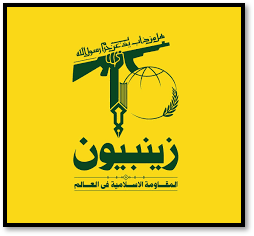 The Zaynabiyoun Brigade is a Pakistani Shiite militia established in 2014 by the Revolutionary Guard Corps and trained by the Qods Force. It has recruited among Pakistanis living in Iran as well as from Pakistan’s tribal areas. It has fought with the Assad regime’s forces in Syria.
The Zaynabiyoun Brigade is a Pakistani Shiite militia established in 2014 by the Revolutionary Guard Corps and trained by the Qods Force. It has recruited among Pakistanis living in Iran as well as from Pakistan’s tribal areas. It has fought with the Assad regime’s forces in Syria.
In 2019, the Treasury Department sanctioned the Zaynabiyoun Brigade for supporting the Qods Force and human rights abuses in Iran. “The brutal Iranian regime exploits refugee communities in Iran, deprives them of access to basic services such as education, and uses them as human shields for the Syrian conflict,” Treasury Secretary Steven Mnuchin charged.
Fatemiyoun Division
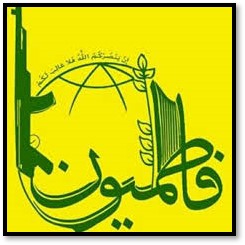 The Fatemiyoun Division is an Afghan militia founded in the 1980s that went dormant in the 1990s and was revived by Iran’s Revolutionary Guards in 2012. It is primarily made up of Hazara refugees from Afghanistan living in Iran. Since 2014, Iran’s Revolutionary Guards have deployed the militia to fight for the Assad regime in Syria. In 2017, some 50,000 Afghans were deployed in Syria.
The Fatemiyoun Division is an Afghan militia founded in the 1980s that went dormant in the 1990s and was revived by Iran’s Revolutionary Guards in 2012. It is primarily made up of Hazara refugees from Afghanistan living in Iran. Since 2014, Iran’s Revolutionary Guards have deployed the militia to fight for the Assad regime in Syria. In 2017, some 50,000 Afghans were deployed in Syria.
The Treasury Department sanctioned the Fatemiyoun Division in 2019 for supporting the Qods Force and engaging in human rights abuses in Iran. It claimed that Iran had coerced Afghan refugees to fight in Syria or face imprisonment in Iran or deportation to Afghanistan.
Bahrain
Saraya al Ashtar (or the Al Ashtar Brigades)
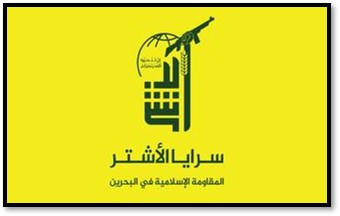 The Al Ashtar Brigades is a militant group based in Bahrain funded, trained and armed by Iran. The State Department charged that it has committed terrorist attacks in Bahrain to overthrow the government. In 2014, the group killed two Bahraini police officers and one Emirati officer in a bomb attack.
The Al Ashtar Brigades is a militant group based in Bahrain funded, trained and armed by Iran. The State Department charged that it has committed terrorist attacks in Bahrain to overthrow the government. In 2014, the group killed two Bahraini police officers and one Emirati officer in a bomb attack.
The Treasury Department designated two Al Ashtar Brigades leaders global terrorists in March 2017. The State Department designated it a Foreign Terrorist Organization in July 2018. Al Ashtar is “another in a long line of Iranian sponsored terrorists who kill on behalf of a corrupt regime,” Nathan Sales, the State Department coordinator for counterterrorism, said in 2018.
The State Department has sanctioned the following al Ashtar Brigades leaders and members:
- Senior member Ahmad Hasan Yusuf: In 2017, for posing a risk of committing acts of terrorism that threaten U.S. interests and national security.
- Senior member Alsayed Murtadha Majeed Ramadhan Alawi: In 2017, for posing a risk of committing acts of terrorism that threaten U.S. interests and national security.
- Member Ali Abdulnabi Ahmed Ebrahim M Alshofa: In 2024, for involvement in suspected lethal aid facilitation in the Middle East.
- Member Hasan Ahmed Radhi Husain Sarhan: In 2024, for involvement in plotting terrorist operations in Bahrain.
- Financier Isa Saleh Isa Mohamed Salman: In 2024, for involvement in money transfers for the group.
- Member Hussein Ahmad ‘Abdallah Ahmad Hussein Al-Dammami: In 2024, for engaging in facilitating lethal aid into Bahrain in support of al Ashtar Brigades.
Saraya al Mukhtar (or The Chosen Brigades)
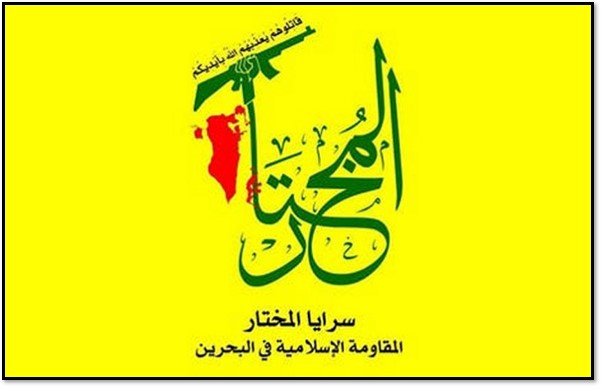 Saraya al Mukhtar is a militant group based in Bahrain funded and supported by Iran. The State Department charged that it plotted attacks against U.S. personnel in Bahrain and offered cash rewards for the assassination of Bahraini officials. Saraya al Mukhtar’s goal is to overthrow the monarchy.
Saraya al Mukhtar is a militant group based in Bahrain funded and supported by Iran. The State Department charged that it plotted attacks against U.S. personnel in Bahrain and offered cash rewards for the assassination of Bahraini officials. Saraya al Mukhtar’s goal is to overthrow the monarchy.
The State Department designated it a Specially Designated Global Terrorist in December 2020.
Palestinian Territories
Hamas (or the Islamic Resistance Movement)
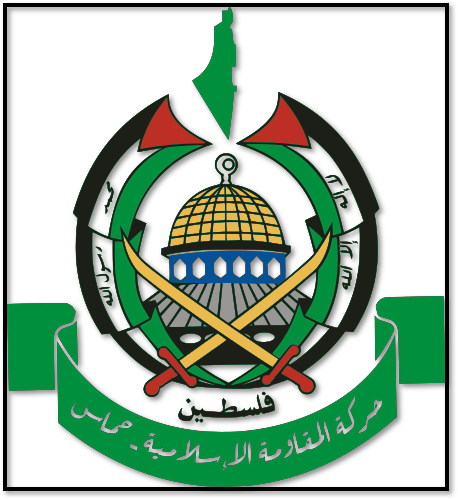 Hamas, or Harakat al Muqawama al Islamiyah, is a Sunni Islamist militia and political party based in Gaza that has reportedly been funded, armed and trained by Iran’s Revolutionary Guards since the early 1990s. Hamas opened an office in Tehran in the 1990s. The U.S. government sanctioned Hamas in 1995, designated it a Foreign Terrorist Organization in 1997 and named it a Specially Designated Global Terrorist in 2001. It has also imposed multiple rounds of sanctions on 21 senior leaders and operatives.
Hamas, or Harakat al Muqawama al Islamiyah, is a Sunni Islamist militia and political party based in Gaza that has reportedly been funded, armed and trained by Iran’s Revolutionary Guards since the early 1990s. Hamas opened an office in Tehran in the 1990s. The U.S. government sanctioned Hamas in 1995, designated it a Foreign Terrorist Organization in 1997 and named it a Specially Designated Global Terrorist in 2001. It has also imposed multiple rounds of sanctions on 21 senior leaders and operatives.
In 2012, Iran cut off funding to Hamas after it refused to support the Assad regime in the Syrian civil war. Iran resumed financial assistance to Hamas in 2017. “Relations with Iran are excellent and Iran is the largest supporter of the Izz ad Din al Qassam Brigades with money and arms,” Yahya Sinwar, a senior Hamas military leader, said in 2017. Iran has provided more than $100 million annually to Palestinian groups, including Hamas and Palestine Islamic Jihad, the State Department reported in 2020.
The Treasury and State Departments have sanctioned the following Hamas leaders:
- Founder and leader in Gaza Sheikh Ahmed Yassin: In 1995, for disrupting the Middle East peace process and in 2003, for committing acts of terrorism.
- Political Bureau Deputy Chief in Syria Musa Abu Marzouk: In 1995, for disrupting the Middle East peace process and in 2003, for committing acts of terrorism.
- Political Bureau member in Syria Imad Khalil al Alami: In 2003, for committing acts of terrorism.
- Senior leader in Lebanon Usama Hamdan: In 2003, for committing acts of terrorism.
- Political Bureau and Executive Committee Head in Syria Khalid Mishaal: In 2003, for committing acts of terrorism.
- Leader in Gaza Abdel Aziz Rantisi: In 2003, for reporting to Hamas leader Sheikh Ahmed Yassin.
- Operative Muhammad Hisham Muhammad Ismail Abu Ghazal: In 2011, for facilitating and disseminating improvised explosive devices (IEDs).
- Senior operative Rawhi Mushtaha: In 2015, for helping found the forerunner of the Izz ad Din al Qassam Brigades, the military wing of Hamas.
- Senior operative Yahya Sinwar: In 2015, for helping found the forerunner of the Izz ad Din al Qassam Brigades, the military wing of Hamas.
- Izz ad Din al Qassam Brigades commander Muhammad Deif: In 2015, for deploying suicide bombers, directing the kidnapping of Israeli soldiers and designing Hamas’ offensive strategy against Israel in 2015.
- Political Bureau member Salih al Aruri: In 2015, for funding and directing military operations in the West Bank against Israel.
- Hamas Finance Committee leader in Saudi Arabia Mahir Jawad Yunis Salah: In 2015, for overseeing the transfer of millions of dollars from Iran and Saudi Arabia to Hamas’ military wing.
- Senior financial officer Abu Ubaydah Khayri Hafiz al Agha: In 2015, for his involvement in funding, investment and money transfers to Hamas in Saudi Arabia.
- Interior Minister Fathi Hammad: In 2016, for coordinating terrorist cells in Gaza and establishing Al Aqsa TV, a Hamas media outlet.
- Military commander Abu Anas al Ghandour: In 2017, for his involvement in Hamas terrorist operations, including a 2006 attack on the Israeli Defense Forces outpost at the Kerem Shalom border crossing.
- Political Bureau president Ismail Haniyeh: In 2018, for his reported involvement in terrorist attacks against Israeli citizens and links to Hamas’ military wing.
- Financial operative in Lebanon Muhammad Sarur: In 2019, for managing money transfers from the Qods Force to Izz ad Din al Qassam Brigades, Hamas’ military wing.
- Financial associate Kamal Abdelrahman Aref: In 2019, for coordinating with Muhammad Sarur to transfer money from the Qods Force to Hamas.
- Financial auditor Fawaz Mahmud Ali Nasser: In 2019, for transferring Iranian funds through Hezbollah to Hamas and managing funds related to Hamas prisoners.
- Finance Office head Zaher Jabarin: In 2019, for managing Hamas’ yearly budget, transferring millions of dollars to Hamas through Redin Exchange and serving as a point of contact between the Qods Force and Hamas.
- Izz ad Din al Qassam Brigades Deputy Commander Marwan Issa: In 2019, for commanding Hamas’ military wing, which carries out attacks against Israel.
- ‘Abdallah Yusuf Faisal: In 2022, for working in the Hamas Finance Ministry.
- Official in the West Bank Musa Muhammad Salim Dudin: In 2023, for purchasing weapons for Hamas and other acts.
- Sudan-based financier Abdelbasit Hamza Elhassan Mohamed Khair: In 2023, for managing Hamas investments.
- Turkey-based operative Amer Kamal Sharif Alshawa: In 2023, for coordinating financial activities.
- Turkey-based operative Ahmed Sadu Jahleb: In 2023, for coordinating financial activities.
- Algeria-based operative Aiman Ahmad Al-Duwaik: In 2023, for coordinating financial activities.
- Turkey-based operative Walid Mohammed Mustafa Jadallah: In 2023, for coordinating financial activities.
- Qatar-based operative Muhammad Ahmad ‘Abd Al-Dayim Nasrallah: In 2023, for transferring funds.
- Military wing member Ayman Nofal: In 2023, for coordinating attacks against Israel.
- Iran-based official Khaled Qaddoumi: In 2023, for representing Hamas in Tehran.
- Military wing leader Hudhayfa Samir ‘Abdallah al Kahlut: In 2024, for serving as the spokesperson for the al Qassam Brigades and leading its cyber influence department.
- Commander William Abu Shanab: In 2024, for heading the Lebanon-based al Shimali unit, which produces weapons.
- Military wing member Bara’a Hasan Farhat: In 2024, for serving as the assistant to Abu Shanab.
- Military wing member Khalil Muhammad ‘Azzam: In 2024, for serving as an intelligence official in the al Shimali unit.
- Military wing member Abd al-Rahman Ismail abd al-Rahman Ghanimat: In 2024, for involvement in terrorist attacks.
- Senior official Musa Daud Muhammad Akari: In 2024, for facilitating the flow of funds from Türkiye into Gaza and the West Bank.
- Senior official Salama Mari: In 2024, for financial facilitation.
- Official Mohammad Nazzal: In 2024, for supporting the group for more than 30 years and representing Hamas's interests to international audiences.
- Senior official Basem Naim: In 2024, for representing Hamas in engagements with Russia and other countries.
- Senior official Ghazi Hamad: In 2024, for editing Hamas propaganda outlets, playing various public facing roles, and overseeing border crossings.
The Treasury Department has sanctioned more than a dozen charities, front companies, and banks for providing financial support to Hamas, including:
- Holy Land Foundation for Relief and Development: In 2001, for providing millions of dollars each year to Hamas.
- Beit el Mal Holdings: In 2001, for being controlled by Hamas.
- Al Aqsa Islamic Bank: In 2001, for functioning as the financial arm of Hamas and being owned by Beit el Mal Holdings.
- Commite de Bienfaisance et de Secours aux Palestiniens (France): In 2003, for providing support and funding to Hamas.
- Association de Secours Palestinien (Switzerland): In 2003, for providing support and funding to Hamas.
- Palestinian Relief and Development Fund (United Kingdom): In 2003, for providing support and funding to Hamas.
- Palestinian Association in Austria: In 2003, for providing support and funding to Hamas.
- Sanabil Association for Relief and Development (Lebanon): In 2003 for providing support and funding to Hamas.
- Al Aqsa Foundation: In 2003, for providing financial support to Hamas.
- Al Salah Society: In 2007, for serving as a charitable front and providing financing for Hamas.
- Islamic National Bank: In 2010, for being controlled by Hamas and providing financial services to Hamas members and employees, including members of the organization’s military wing.
- Al Waqfiya al Riaya al Usra al Filistinya wa al Lubnanya: In 2012, for being controlled by and providing financial support to Hamas.
- Al Quds International Foundation: In 2012, for being controlled by and acting on behalf of Hamas.
- Asyaf International Holding Group for Trading and Investment: In 2015, for its involvement in investments and money transfers on behalf of Hamas.
- Ahmed Sharif Abdallah Odeh: In 2022, for overseeing Hamas investments.
- Usama Ali: In 2022, for coordinating financial transfers to Hamas.
- Hisham Younis Yahia Qafisheh: In 2022, for helping to transfer funds to Hamas.
- Agrogate Holding: In 2022, for being linked to or controlled by Hamas.
- Al Roward Real Estate Development: In 2022, for being linked to or controlled by Hamas.
- Anda Company: In 2022, for being linked to or controlled by Hamas.
- Itqan Real Estate JSC: In 2022, for being linked to or controlled by Hamas.
- Sidar Company: In 2022, for being linked to or controlled by Hamas.
- Trend GYO: In 2022, for being linked to or controlled by Hamas.
- Buy Cash Money and Money Transfer Company and representative Ahmed M.M. Alaqad: In 2023, for providing financial services to Hamas.
- Al Ansar Charity Association: In 2023, for providing funds for terrorist recruitment and to families of terrorists affiliated with Hamas and PIJ.
- Nasser Al Sheikh Ali: In 2023, for directing the Al Ansar Charity Association.
- Sudan-based Zawaya Group for Development and Investment Co. LTD: In 2023, for being controlled by Hamas financier Abdelbasit Hamza Elhassan Mohamed Khair.
- Spain-based Zawaya Group for Development Investment Sociedad Limitada: In 2023, for being controlled by Hamas financier Abdelbasit Hamza Elhassan Mohamed Khair.
- Sudan-based Larrycom for Investment Company: In 2023, for being controlled by Hamas financier Abdelbasit Hamza Elhassan Mohamed Khair.
- Turkey-based Alaeddin Senguler, Gulsah Yigidoglu, and Arwa Mangoush: In 2023, or having materially assisted, sponsored, or provided financial, material, or technological support for, or goods or services in support of, Hamas.
- Hamid Abdullah Hussein al Ahmar and nine companies controlled by him: In 2024, for managing Al-Quds International Foundation, a charity controlled by Hamas, as well as the group's investment portfolio
- Italy-based Mohammad Hannoun and the Charity Association of Solidarity with the Palestinian People: In 2024, for fundraising for Hamas's military wing
- Germany-based Majed al-Zeer: For fundraising for Hamas
- Austria-based Adel Doughman: For fundraising for Hamas
- Al-Intaj Bank: For providing financial services for Hamas
Palestinian Islamic Jihad (or Harakat al Jihad al Islami al Filistin)
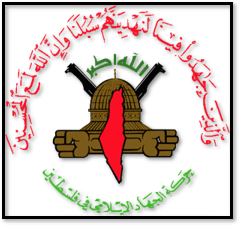 Palestinian Islamic Jihad (PIJ) is a Sunni Islamist militant group in Gaza funded, trained and armed by Iran since the late 1980s. Although based in Damascus, it has long maintained an office in Tehran. The United States first sanctioned Palestinian Islamic Jihad in 1995 for disrupting the Middle East peace process and designated it a Foreign Terrorist Organization in 1997 for committing terrorist acts that threaten U.S. interests and national security.
Palestinian Islamic Jihad (PIJ) is a Sunni Islamist militant group in Gaza funded, trained and armed by Iran since the late 1980s. Although based in Damascus, it has long maintained an office in Tehran. The United States first sanctioned Palestinian Islamic Jihad in 1995 for disrupting the Middle East peace process and designated it a Foreign Terrorist Organization in 1997 for committing terrorist acts that threaten U.S. interests and national security.
Iran provided more than $100 million annually to Palestinian groups, including Hamas and PIJ, the State Department reported in 2020. “The Palestinian Islamic Jihad is another fruit of the Ayatollah Khomeini’s fructuous tree,” Secretary General Ramadan Shallah said in 2002. Iran reportedly cut off funding to the group in May 2015 because it did not support Tehran’s involvement in Yemen. It renewed funding in May 2016.
The Treasury and State Departments have sanctioned the following Palestinian Islamic Jihad leaders:
- Secretary General Ramadan Shallah: In 1995, for disrupting the Middle East peace process.
- Co-founder and ideological leader Abd al Aziz Awda: In 1995, for disrupting the Middle East peace process.
- Secretary General Ziyad al Nakhalah: In 2014, for his involvement in terrorist attacks against Israel.
- Deputy Secretary General Muhammad al Hindi: In 2019, for committing acts of terrorism that threaten U.S. interests and national security.
- Higher Military Council member Baha Abu al Ata: In 2019, for committing acts of terrorism that threaten U.S. interests and national security.
- Deputy Secretary General and al Qods Brigade Leader Akram al Ajouri: In 2023, for being a leader of PIJ, as a Specially Designated Terrorist.
The Treasury Department has sanctioned at least two charities for providing financial support to PIJ:
- Elehssan Society: In 2005, for serving as a charitable front and providing financing to PIJ.
- Al Ansar Charity Association: In 2023, for providing funds for terrorist recruitment and to families of terrorists affiliated with Hamas and PIJ.
- Nasser Al Sheikh Ali: In 2023, for directing the PIJ-affiliated Al Ansar Charity Association.
Saudi Arabia
Hezbollah al Hejaz (or the Saudi Party of God)
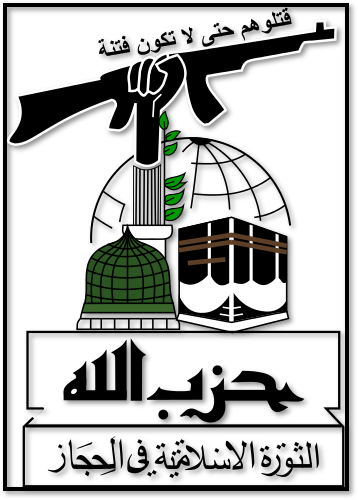 Hezbollah al Hejaz was a Shiite militant group founded in 1987, modeled on Lebanon’s Hezbollah, and aligned with Iran. In 2001, the United States sanctioned four leaders linked to the 1996 Khobar Towers bombing that killed 19 U.S. Air Force personnel and wounded 372.
Hezbollah al Hejaz was a Shiite militant group founded in 1987, modeled on Lebanon’s Hezbollah, and aligned with Iran. In 2001, the United States sanctioned four leaders linked to the 1996 Khobar Towers bombing that killed 19 U.S. Air Force personnel and wounded 372.
In 2001, the Justice Department indicted Iran for financing and directing the Khobar Towers attack by Saudi Hezbollah. In 2006, a U.S. federal court ordered Iran to pay $254 million to the families of the Americans who died in the attack. The evidence “firmly established that the Khobar Towers bombing was planned, funded and sponsored by senior leadership in the government of the Islamic Public of Iran,” the court ruled. After the Saudi crackdown on Hezbollah al Hejaz following the Khobar Towers bombing, the organization effectively disappeared.
The State Department sanctioned the following Hezbollah al Hejaz leaders:
- Leader Abdelkarim Hussein Mohamed al Nasser: In 2001, for carrying out the bombing of the Khobar Towers military housing complex in Dhahran, Saudi Arabia, in 1996.
- Senior leader and military wing head Ahmad Ibrahim al Mughassil: In 2001, for carrying out the bombing of the Khobar Towers military housing complex in Dhahran, Saudi Arabia, in 1996.
- Member Ali Saed Bin Ali el Hoorie: In 2001, for carrying out the bombing of the Khobar Towers military housing complex in Dhahran, Saudi Arabia, in 1996.
- Member Ibrahim Salih Mohammed al Yacoub: In 2001, for carrying out the bombing of the Khobar Towers military housing complex in Dhahran, Saudi Arabia, in 1996.
*Seven leaders have been sanctioned multiple times, under different administrations. The following leaders were only included in the tallies for the administrations that first sanctioned them.
- Hassan Nasrallah - 3 times
- Akram Abbas al Kabi - 2 times
- Sheikh Ahmed Yassin - 2 times
- Musa Abu Marzouk - 2 times
- Abd al Khaliq al Houthi - 2 times
- Abdullah Yahya al Hakim - 2 times
- Abdul Malik al Houthi - 2 times
Ashley Lane was a research assistant at the Woodrow Wilson Center in 2021, when the first iteration of this report was published. It has since been updated by USIP staff.
